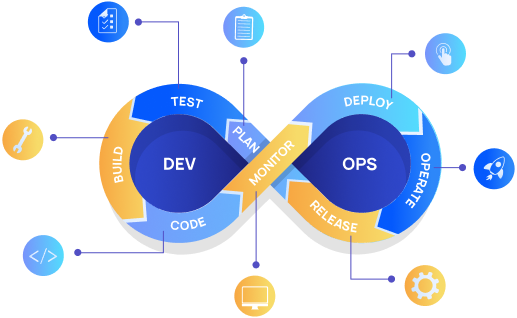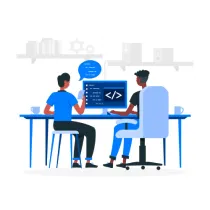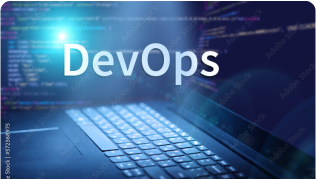DevOps Automation
Faster, Secure Integration for Agile Development
Accelerate Application Onboarding and GTM Strategy with Our DevOps Automation Services
We adhere to efficient DevOps tools and automated delivery pipeline allowing your business to achieve faster onboarding of applications, and a streamlined GTM strategy at reduced cost. Our DevOps Automation services help businesses automate various aspects of development and operations to enable faster deployment, improved collaboration, and increased efficiency, leading to accelerated business growth and market success.
Drive Business Growth Through DevOps Automation
Enterprise adoption of DevOps Automation is fuelling remarkable business growth, driven by increased investments in software-driven innovations, automated systems, and modern development methodologies. With DevOps Automation services, organizations can re-engineer their development and deployment processes, enabling continuous evolution and significant improvements in product development speed and reliability. At Gsoft, we specialize in providing tailored DevOps Automation solutions designed to streamline your development and IT operations, leveraging agile development strategies.
Key Benefits of DevOps Automation Solutions
Faster delivery cycles and market reach
Efficient scaling with reduced risk
Early detection of errors allows timely fixes
Enhanced security packaged with automated compliances
Improved collaboration saves time increase team efficiency
Faster response to evolving customer and market demands

Gsoft Approach to DevOps Automation
Implementing DevOps in your software delivery is a key transformation driver that unlocks tremendous possibilities allowing you to deliver predictable results with speed, quality, and stability. We believe this is not just a technology undertaking but a fundamental shift in your process, work culture and engineering. Our holistic approach tailored for your organization would help you unlock maximum potential from DevOps implementation.
Evaluate and Plan

We work in close coordination with your technical team to identify the organization’s need of DevOps and elements that make sense for your business.
Design

We design and customize the right implementation frameworks based on inputs and feedback received during discovery while remaining aligned to your organization’s short- term and long-term goals.
Implement

Our experts work closely with your team to put the right automation tools and practices in place aligned with the solution blueprints.
Manage

We provide post-implementation support and maintenance throughout the production and delivery lifecycle to fine-tune your DevOps implementation.



CASE STUDY
How Gsoft Omni's DevOps and Automation Empowered Efficient Omni-Channel Services for a Leading MNC
Gsoft Omni's emphasis on DevOps and automation empowered an organization to deliver high-quality services efficiently....
Read more


CASE STUDY
Here’s How Gsoft Helped an International Company to Streamline Event Management Software Delivery
To tackle the challenges posed by increasing customer demand, a leading event management company's IT team.....
Read more


BEST PRACTICES
Gsoft DevOps and Automation Best Practices: Streamline Software Development and Deployment
At Gsoft, we have revolutionized software development and deployment through a comprehensive range of best practices...
Read moreDevOps Automation Best Practices
Discover some of the DevOps Automation best practices that can streamline your organization's application development process and help establish a strong DevOps culture.

CI/CD
Gsoft provides battle-tested CI/CD architectures customized for your enterprise. We help your development team set up source control systems integrated with RBACs (Role-based Access Control) along with industry-standard source control best practices. Our frameworks support integration with almost all popular build systems and artifact repositories. Integration with testing and code quality frameworks ensures that code is robust and readable. With our DevSecOps services, we ensure security is baked into every step of your build automation, including secure containers, automatic container scans, and code security scans. We support automated deployment across cloud platforms such as Kubernetes, Virtual Machines, or Serverless Architectures.

Monitoring and Logging
Our seasoned technical architects help refactor your code to microservice architectures involving the latest cloud design patterns. This ensures your code can not just scale well to the cloud but also be more maintainable and amenable to modern DevOps practices.

Microservices
Our seasoned technical architects help refactor your code to microservice architectures involving the latest cloud design patterns to ensure your code can not just scale well to the cloud but also be more maintainable and amenable to modern DevOps practices.

Infrastructure as Code
With IaC, the majority of our cloud environments are provisioned via a script which means error-free and robust infrastructure guaranteed to comply with standards. This also helps your infrastructure is repeatable and portable across clouds.

Communication and Collaboration
No matter what the level of automation, the human element still plays a vital role in the success of your processes. Hence, we provide integrations with the most popular communication and project planning suite of products ensuring a full traceability matrix and compliance to your business processes.
Microservices
Our seasoned technical architects help refactor your code to microservice architectures involving the latest cloud design patterns to ensure your code can not just scale well to the cloud but also be more maintainable and amenable to modern DevOps practices.
CI/CD
Gsoft provides battle-tested CI/CD architectures customized for your enterprise. We help your development team set up source control systems integrated with RBACs (Role-based Access Control) along with industry-standard source control best practices. Our frameworks support integration with almost all popular build systems and artifact repositories. Integration with testing and code quality frameworks ensures code is robust and readable. With DevSecOps, we ensure security is baked into every step of your build automation including secure containers, automatic container scans, and code security scans. We support automated deployment across cloud platforms such as Kubernetes, virtual machines, or serverless architectures.
Infrastructure as Code
With IaC, the majority of our cloud environments are provisioned via a script which means error-free and robust infrastructure guaranteed to comply with standards. This also helps your infrastructure is repeatable and portable across clouds.
Monitoring and Logging
Our seasoned technical architects help refactor your code to microservice architectures involving the latest cloud design patterns to ensure your code can not just scale well to the cloud but also be more maintainable and amenable to modern DevOps practices.
Communication and Collaboration
No matter what the level of automation, the human element still plays a vital role in the success of your processes. Hence, we provide integrations with the most popular communication and project planning suite of products ensuring a full traceability matrix and compliance to your business processes.
Gsoft Insights
Technology continues to evolve, and we don’t want you to be left behind. Explore some valuable insights and guidance on implementing DevOps technologies at your organizational level.



BLOG POST
How to Secure DevOps through DevSecOps Automation? – 6 DevSecOps Best Practices
DevOps automation enabling development teams to automate tedious manual development tasks while promoting better team collaboration and...
Read more


BLOG POST
How to tackle the challenges in DevSecOps automation?
DevSecOps implementations are gaining more traction in today’s enterprises as organizations are beginning to reap more benefits such as better collaborative development processes, unifie...
Read more


BLOG POST
Best DevOps implementation tools to choose in 2023
Enterprise adoption of DevOps has increased significantly as stakeholders are increasingly reaping its benefits. As per, ‘DevOps Market size was valued at USD 3.62...
Read moreDevSecOps: The Essential Tool for Securing Your DevOps Process
DevSecOps incorporates security into DevOps. It strengthens your enterprise against cyberattacks by reducing vulnerabilities, encouraging shared responsibility, and identifying issues early. With DevSecOps, attain collaboration and secure software delivery. Instill a security-first mindset throughout your organization using DevSecOps, starting from the earliest stages of the development process.
Our comprehensive approach integrates security measures seamlessly into every step, from planning and coding to deployment and beyond. This proactive approach helps you find and fix security flaws before they cause data breaches and cyberattacks. Developers, security professionals, and operations teams work together to create a culture of continuous security improvement, making your apps and infrastructure secure and reassuring your customers and stakeholders.

FAQs of DevOps Automation
Frequently Asked Questions
Q:
What's the difference between DevOps and DevSecOps?
DevOps and DevSecOps emphasise communication and collaboration between developers, system administrators, and security experts. However, the two approaches differ. The goal of DevOps is to improve software delivery and development cycles. This is achieved by the use of automation, the elimination of silos, and the coordination of information amongst various groups. A CI/CD pipeline is a common tool for DevOps teams to employ when deploying new or updated code to production. DevSecOps is an extension of DevOps that puts a greater emphasis on security. DevSecOps teams embed security procedures all through the SDLC, from requirements analysis through rollout. This guarantees that security is taken into account from day one of development and that security risks are reduced all through the SDLC.
Q:
What is the difference between DevOps automation and test automation?
DevOps automation automates software development and delivery. This includes code deployment, infrastructure setup, and testing. DevOps automation speeds up software development to operation. Test automation—automated software testing—is new. Unit, integration, and user acceptance testing are included. Test automation improves efficiency and effectiveness.
Q:
Does DevOps require automation?
Yes, Automation is necessary for DevOps. DevOps is an approach that merges the traditionally separate fields of software development (Dev) and information technology operations (Ops) in order to speed up the continuous delivery of creating new software and releasing it to users. DevOps relies heavily on automation since it speeds up software delivery, improves quality, and lowers risk.
Q:
What DevOps processes can be automated?
Many tasks in DevOps can benefit from being automated. Some of the most frequent are as follows:
- Continuous Integration (CI): CI refers to the method of automatically constructing and testing new versions of software. This facilitates rapid and dependable deployments to production, ensuring that code is always in a release-ready state.
- Continuous Delivery (CD): The term "continuous delivery" (CD) refers to the method of automatically releasing updated code to users. This makes production modifications fast, reliable, and easy to roll back if needed.
- Infrastructure as Code (IaC): IaC refers to the process of defining and managing infrastructure through the use of computer code. This facilitates the infrastructure's consistency, repeatability, and adaptability to change.
- Monitoring and alerting: The performance of systems and apps can be tracked and alarms triggered automatically using automation. This aids in finding issues before they affect users and getting them fixed as soon as possible.
- Release management: Automation can be used for release management tasks including writing and organizing release notes, monitoring release status updates, and pushing new versions into production.
- Configuration management: Automation can be used for configuration management, which entails keeping tabs on configuration changes, checking for inconsistencies, and enforcing standardization.
- Security: Automating security procedures like vulnerability scanning, plugging security flaws, and enforcing security policies is possible with automation.
Q:
How would DevOps automation help me in app development?
There are many ways in which automating DevOps might benefit your app development efforts:
- Increased speed: is possible because repetitive operations like code builds, deployments, and testing may be automated with the help of automation tools throughout app development. As a result, developers may have more time for exploratory and strategic endeavours.
- Improved app quality: By automating testing and verification, automation can assist in improving app quality. This can aid in making sure that apps are bug-free and suitable for their intended purpose.
- Reduced risks: Errors are less likely to occur when tasks that are prone to human error are automated. This can assist in guaranteeing a secure production deployment of applications.
- Improved collaboration: between devs, QA, and ops can be greatly enhanced through the use of automation. This can aid in ensuring that all users are on the same build of the software and that any updates are pushed to production as soon as possible.
- Improved transparency: Automation can improve transparency throughout the app development process. This can aid in pinpointing inefficiencies and potential problem spots.
Q:
How to Get Started With DevOps Automation?
-
Figure out which tasks need to be automated:
Determining which practices will have the greatest impact on your firm is vital. Automation may benefit:
- Continuous integration and continuous delivery (CI/CD)
- Infrastructure as code (IaC)
- Monitoring and alerting
- Release management
- Configuration management
-
Select appropriate tools:
There are many options for DevOps automation tools; picking the ones that work best for your business is essential.
-
Make a plan:
Planning is the next step after deciding which tasks will be automated and selecting the appropriate technologies. As part of this strategy, you should also consider:
- The specific tasks that you want to automate
- The tools that you're going to use
- The steps involved in each task
- The resources that you'll need
-
Monitor and refine:
You need to keep an eye on the outcomes and refine your methods as you go along once you've put the plan into action. Find out where your automation is lacking so you can fix it.
Q:
What are some common mistakes to avoid when automating DevOps?
-
Not having a clear plan:
Before automating, establish a plan. This will prevent errors and assure automation success.
-
Not using the right tools:
Selecting the correct DevOps automation technologies for your company is crucial.
-
Not testing your automation:
Before releasing automation, test it. This will help you find issues and make sure your automation works.
-
Not monitoring your automation:
Monitoring production-deployed automation is crucial. This will help you find issues and ensure your automation meets your needs.


Need Help? Contact Our Sales
Want additional information on our DevOps automation services? Please don't hesitate to contact our sales team, who can respond to your questions and provide the right guidance.
